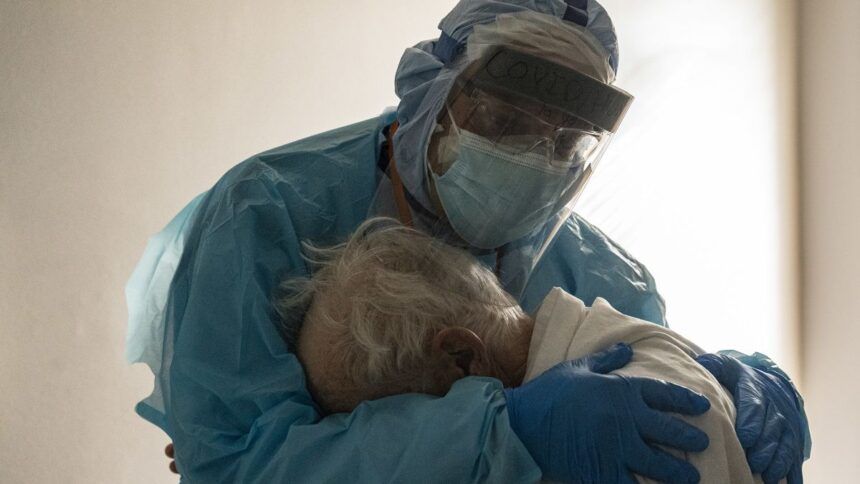Nearly 60,000 Americans could die of Covid-19 in the next three weeks. There are ways to turn things around, experts say

(CNN) -- The Covid-19 pandemic is raging across the US -- already more devastating than previous surges and showing no signs of slowing down.
On Thanksgiving, the US marked its 24th day in a row with more than 100,000 new cases. Hospitalizations Thursday hit a new high -- for the 17th consecutive day -- with now more than 90,400 Covid-19 patients nationwide, according to the COVID Tracking Project. More than 1,200 deaths were reported.
The country's death toll since the pandemic's start is now more than 263,000. And nearly another 60,000 could lose their lives over the next three weeks, according to an ensemble forecast published by the US Centers for Disease Control and Prevention this week.
One expert told CNN Wednesday night the number of daily deaths will likely double in the next ten days.
"So, we'll be seeing close to 4,000 deaths a day, which is how you get another 60,000 deaths in only about 20 days," Dr. Jonathan Reiner, a professor of medicine at George Washington University, said.
And the gatherings that took place over Thanksgiving could further an already ferocious surge, officials warned this week, urging Americans to avoid travel and celebrate with immediate household members only. Many Americans listened, a poll showed this week, but millions of others have boarded planes across the country since last week.
"In a week, more likely two weeks, we will see a surge upon a surge," Dr. William Schaffner, professor of infectious diseases at Vanderbilt University, said Wednesday. "We're in for a tough time."
In other words, projections for the coming weeks are grim. But that doesn't mean it's too late to begin turning things around.
"It we all got together, wore the masks and did the social distancing, we could bend this curve within two or three weeks," Schaffner said. "We would see actually transmission go down even before we get to the vaccines."
What it would take to turn the tide
While a possible vaccine candidate could soon get the green light, widespread effects of a vaccine are still months away. But Americans have valuable tools that can help in the meantime.
They are the public safety measures that have been touted by officials for months -- face masks, social distancing, avoiding crowds and practicing good hygiene like regular hand washing.
It's a simple step, but could make a world of a difference. More than 40,000 lives could be saved over the next two months if 95% of Americans wore face masks, according to projections from the University of Washington's Institute for Health Metrics and Evaluation.
Amid the crisis, more local and state leaders have pushed out mask orders in the past few weeks hoping to curb Covid-19 spread -- including GOP governors who previously resisted similar mandates.
Meanwhile, in West Virginia, Gov. Jim Justice has pleaded with residents in the past weeks to wear a face covering, saying masks are "really the only bullet in the gun."
"If you're inconvenienced, if you don't believe in it, please wear it ... what's the downside," Justice said in a news conference this week. "Look, we're not one to take anybody's rights. My good lord, I get it wholeheartedly, we don't want to do that in any way. But you gotta help me."
It's the kind of message that needs to be echoed by local leaders across the country, Dr. Peter Hotez, dean of tropical medicine at the Baylor College of Medicine, told CNN Thursday morning.
"Keep saying it every day and hope that some people actually start to believe it. That's our only hope at this point. We've got to limit those surges and we need those local leaders to really step up, so this is absolutely vital," he said.
It's the only option that could help keep more people alive until a vaccine, he said.
"It's a matter of keeping your mother, your father, your brother, your sister alive between now and then," Hotez added. "If we could just get those messages out."
Florida extends ban on cities imposing mask mandates
But in many parts of the US, masks remain a point of contention.
Florida Gov. Ron DeSantis extended an order this week that bans local municipalities from issuing fines for violations of pandemic-related mandates -- like mask mandates -- or limiting restaurant capacity without justification.
The extension is in stark contrast with other state leaders' recent announcements of further restrictions and more enforcement. In Connecticut, Gov. Ned Lamont issued an executive order this week increasing the maximum fine for businesses violating Covid-19 orders to $10,000. The previous maximum penalty was $500.
Miami Dade County Mayor Daniella Levine Cava took to Twitter Wednesday after the Florida governor's extension, noting "bipartisan governors nationwide are putting mask orders in place as one of the best tools we have to fight COVID19."
"It's deeply frustrating that @GovRonDeSantis continues to block local actions and make it harder for local leaders to keep our communities safe," Cava wrote.
"I'm asking the governor to work with local mayors so we can bring our local knowledge to the table," Cava added. "We need to work together to create policies that will protect all our families and our economy in this moment of crisis.
In the past week, Florida has reported more than 56,400 new infections and more than 520 deaths, according to Johns Hopkins University data.
CNN has reached out to DeSantis's office for comment.
Only 1 in 8 US Covid-19 cases may have been counted
In total, more than 12.8 million Americans have tested positive for the virus since the pandemic's start. But a new study suggests that could only be a small fraction of the true number of infections in the US.
Only about one in eight -- or 13% --- all of Covid-19 infections in the country were recognized and reported through the end of September, researchers at the CDC estimate. That means as many as 53 million people in the US could have been infected from February through September -- yet during that time, only about 7 million confirmed cases of symptomatic Covid-19 were reported nationally, the researchers noted.
To estimate the number of Covid-19 cases that may have been missed since the beginning of the pandemic, the researchers used a model to adjust the reported numbers of symptomatic cases in the US. They considered what's known about detecting cases, asymptomatic infections, patients seeking care or not and the risk of false negative test results.
The study's limitations included that the availability and use of testing has changed over time and their findings serve only as estimates.
While the numbers may seem large, the researchers wrote that, still "this indicates that approximately 84% of the US population has not yet been infected and thus most of the country remains at risk, despite already high rates of hospitalization."
The-CNN-Wire
™ & © 2020 Cable News Network, Inc., a WarnerMedia Company. All rights reserved.



